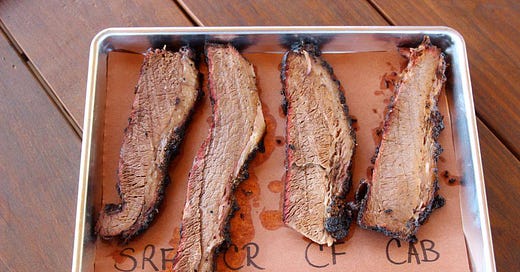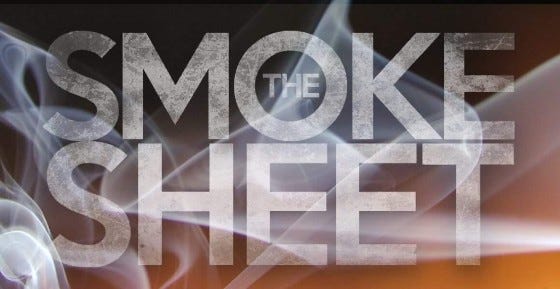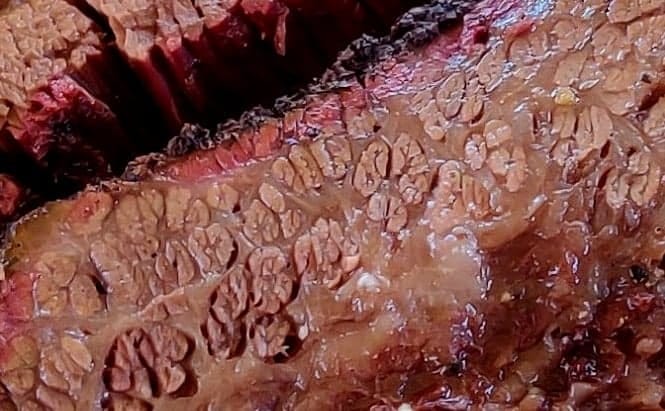Why Wagyu isn’t worth it (especially now)
This week’s guest article is written by Bryan Norton, co-host of the Tales from the Pits podcast. Through more than 100 episodes, Tales from the Pits has chronicled the Texas BBQ scene and highlights the food, personalities, and traditions of the Lone Star State’s smoked meats. If you would like to write a guest article for The Smoke Sheet, please get in touch.
Staring at the four walls of my house during this time of the COVID-19 crisis, I’ve been dreaming of some great BBQ road trips and reminiscing of the past ones. Among those memorable trips were visits to joints serving up “American Wagyu” beef.
There’s been a lot of hype in the barbecue world lately regarding Wagyu, but there is also a lot of misunderstanding. Is it really worth the extra cost or is it overkill? The answer, in my opinion, is “that depends.”
Here's a Wagyu brisket flight with four different brands that I tried at Killen's Barbecue.
What Is Wagyu?
Wagyu, by definition, means “Japanese Cow.” Wagyu is not a single breed of cattle, but it is recognized as any of these four: Japanese Black, Brown (aka Japanese Red or Akaushi), Shorthorn, and Polled. Japanese Wagyu is prized for its high level of intramuscular fat and flavor, which has a distinct look and taste from any U.S. breed. This is due to the lineage of the cattle and their care, environment, and feeding.
It is technically impossible to perfectly emulate and produce Wagyu in America, but ranchers have created a product that embodies many of the positive qualities of Japanese Wagyu. There is nothing wrong with this, but it’s important to note that American Wagyu is a different product altogether than Japanese Wagyu.
What Is American Wagyu?
The USDA has no grading for Wagyu or Akaushi, but there are USDA Certified Programs for them that can help reassure the consumer of the specification of the brand.
Ranchers have crossbred purebred Japanese cattle with American breeds (such as Angus), and they can and do produce a product above USDA Prime grading capabilities. The USDA grading scale peaks at Prime, which does not accommodate the marbling levels of Wagyu. To make up for the inability to grade up to Wagyu, producers will sometimes reference the Japanese Meat Grading Association (JMGA) grading and specification to identify and differentiate their products.
Snake River Farms, for example, uses the Japanese scale “BMS” or Beef Marbling Standard to define their branding between “black” and “gold” products. Gearhart and Hi View Ranch produce the brand Wagyu Excelente, also using the Japanese Black crossbred with Angus. Heartbrand began over 20 years ago with imported Japanese Brown cattle, and their product is marketed as Akuashi independently of Wagyu.
I’ve had all three of the above products and there is a flavor and texture difference over standard American cattle breeds. I do find all the minutiae and marketing confusing but understand that these purveyors need to differentiate their products.
A close-up of Wagyu Excelente from Gearhart and Hi View Ranch.
Is it Worth Splurging for American Wagyu and Akaushi?
As you probably know, there is a hefty price premium that goes with these products. In a few scenarios it may be worth spending the extra cash, but in most cases the hype exceeds the benefit.
If you want a luscious ribeye, I can see splurging for a special occasion at home. I have had some underwhelming experiences at steakhouses, and I’m not sure I would shell out the extra cash at a steakhouse for American Wagyu.
If you are in a barbecue cookoff, you might have a good reason to purchase an American Wagyu product. That said, in one of the last cookoffs I participated in, we placed 9th with an H-E-B store-bought Select brisket, so anything goes. But at the highest levels of competition, American Wagyu could give you an edge. Since a competition turn-in is from the lean side, the intramuscular fat in American Wagyu could help. I already think competition barbecue is out of control, and costs to compete can be obscene, but I can see the mentality of tossing even more money into the ring to try and place higher.
Personally, I like fatty brisket, and I am not a fan of the lean. I understand fully that the lean is the hardest half to get right when cooking, and I also get that if you want to judge a competition or even a retail barbecue joint, get a slice of lean. However, if I’m going to eat a plate of barbecue for the sheer enjoyment and indulgence, it’s going to be slices of nice fatty brisket off the point. With today’s Prime brisket, there is puh-lenty of fat and richness.
With excellent Prime brisket retailing as high as $30 a pound in Texas, and averaging roughly $22 to $23, I find it hard to pay a premium on top of that. If a restaurant is offering Prime and also offering American Wagyu at a premium, I don’t have much desire to pay more. If you’re a lean fan, then go for it. I’ll put that difference in my piggy bank for a bottle of bourbon.
Where to Get American Wagyu in Texas
If you want to experience Wagyu barbecue in person, there are a few joints in Texas you where you can try it:
In Ft. Worth, you can get an entire beef menu from Derek Allan’s Texas Barbecue featuring Wagyu Excelente, including house-made sausage.
In Dallas, Cattleack Barbeque not only features Akaushi from Heartbrand beef but does so at the incredibly low price of $19 a pound. The entire menu is spectacular, so come hungry.
Black Board Bar B Q in Sisterdale, Texas offers Wagyu Excelente along with some unique bites such as Luckenbach Lollipops.
In the San Antonio area, Smoke Shack has offered Wagyu in the past as specials. They source through Peeler Farms.
2M Smokehouse in San Antonio started experimenting with Heartbrand Akaushi in early 2020 and even if they don’t serve it now, 2M should be on your shortlist to visit either way.
On a final note, you can also get mail-order meat directly from the ranches such as Heartbrand and Snake River Farms. And the site Crowd Cow uses multiple sources and can ship high-end variants including imported and graded genuine Japanese Wagyu. As for me, I’m going to opt for a mail-order Prime brisket from a local joint to keep me full during the rest of the coronavirus era.
Bryan Norton
Co-Host, Tales from the Pits
Here are the top recent barbecue news stories from around the country:
The Smoke Sheet won 1st place for Best BBQ Blog at the NBBQA’s Awards of Excellence.
The National Barbecue and Grilling Association (NBBQA) hosted its Awards of Excellence online last week, with awards going to many of the biggest names in the BBQ world. The Smoke Sheet was honored to win 1st place for Best BBQ Blog during the awards!
Food & Wine checked in with multiple BBQ operations around the country to see how they were adapting to the coronavirus crisis, including Moo’s Craft Barbecue in Los Angeles, Holy Trinity Barbecue in Portland, 2M Smokehouse in San Antonio, Franklin Barbecue in Austin, Heritage Barbecue in Orange County, and Horn Barbecue in Oakland.
Texas Monthly BBQ Editor Daniel Vaughn is back in action and has been interviewing joints about their survival strategies and adapting to coronavirus. These interviews include:
Evie Mae’s in Wolfforth has “turned its parking lot into a huge drive-through, complete with a forklift menu on butcher paper.”
Leroy & Lewis in Austin is “offering virtual classes and even recently went viral with a blindfolded-brisket-trimming video.”
Smokey John’s in Dallas is “doing everything from Facebook Live chats to free delivery service to help cope during the pandemic.”
BBQ writer and editor Robert Moss, in a second installment in Southern Living, continues to make the case for South Carolina's hash and rice. He thinks it may even get bigger, partly because “a few pioneering Texas barbecue restaurants have started serving South Carolina-style hash and rice.”
In a related article to Moss’, rocket scientist and pitmaster Dr. Howard Conyers wrote about traditions surrounding South Carolina hash and makes the case that true hash should be made with hog’s head, liver, and lungs, but it’s unlikely you’ll find that in many restaurants.
Before COVID-19 hit, Houstonia Magazine compiled an outstanding list of 12 joints ushering in the new wave of barbecue in Houston.
Adamson Barbecue in Toronto spoke with blogTO about its innovations and tweaks in order to keep the business running in the era of coronavirus.
Joe Walters, the owner-pitmaster at Texas Joe’s Slow Smoked Meats in London, spoke with J.C. Reid of the Houston Chronicle about his decision to close his restaurant in wake of COVID-19.
Though you might not be able to travel to your favorite barbecue joints right now, if you are looking for delicious Tennessee barbecue delivered right to your doorstep, Forbes has you covered.
Wilber’s Barbecue, a classic North Carolina barbecue joint in Goldsboro that closed over a year ago due to tax issues, has been purchased by investors and is looking to re-open this spring.
If you are tired of using the same old bottled sauces, Food & Wine gives you thirteen great ideas for barbecue sauces to make at home.
Here are BBQ shows, podcasts, or books you should check out this week:
Kevin Kelly interviews Stan Hays and Todd Johns about a new program they have started to feed Kansas City during the COVID-19 pandemic.
Watch: Stan Hays from Operation BBQ Relief and Todd Johns from Plowboys Barbeque - Kevin’s BBQ Joints
In this episode, host Kevin Kelly chats with Stan Hays from Operation BBQ Relief and Todd Johns from Plowboys Barbeque about their pilot Restaurant Relief Program that began in Kansas City on Tuesday, March 31st to assist those in need during the COVID19 crisis. Hays talks about how Operation BBQ Relief had to rethink their way of serving meals to those in need during the pandemic. The organization has partnered with Todd Johns’ Plowboys Barbeque to prepare and distribute 2,500 meals a day in Kansas City. Watch here.
Listen: Sean Ludwig from The Smoke Sheet and Sterling Ball from Big Poppa Smokers - The BBQ Central Show
Host Greg Rempe is joined by Sean Ludwig from The Smoke Sheet and NYC BBQ to talk about the current state of affairs as it relates to the barbecue world and how he sees this playing out over the next few weeks and months. They recap his recent trip to Italy in advance of the big virus outbreak and what he is doing to stay safe. Then Sterling Ball from Big Poppa Smokers helps close the show by talking about how the current state of the country is affecting his online business (and music business) and what he thinks the competition season is going to look like once we resume normal life. Listen to the episode here.
Read: Texas Q: 100 Recipes for the Very Best Barbecue from the Lone Star State, All Smoke-Cooked to Perfection - by Cheryl Alters Jamison
Cheryl Alters Jamison, co-author with her late husband Bill of the definitive Texas Home Cooking and the original bible for backyard smoke-cooking, Smoke & Spice, knows her brisket backward and forwards and offers several delectable recipes in this exciting book. Cheryl also knows that there's more to Texas barbecue than brisket. Among the more than 100 recipes in these pages you will find loads of ideas for other cuts of beef, as well as for chicken, pork, lamb, fish and other seafood, and vegetables, each infused — via rubs and mops and sauces and spices — with robust, distinctive Texas flavors. This title will be released on April 28, 2020. Pre-order here.
Smoked ham is an easy recipe to make on the smoker for your Easter celebrations.
Ham on the Big Green Egg — Jon Solberg
For this week’s Recipe of the Week, we chose this recipe for Ham on the Big Green Egg by Jon Solberg, featured on GrillGirl.com. With the upcoming Easter holiday fast approaching, smoked ham is the perfect dish to serve your family. This recipe goes into depth about what kind of ham to buy, how to prepare it on the smoker, and offers tips for a nice finishing glaze. View the recipe here.
In light of the constantly changing coronavirus crisis, we will be leaving this section blank for the next few weeks. Many events you know and love have been postponed. We’ll be updating the events section on our website with the most up-to-date information as we have it.
See the full Smoke Sheet events calendar online here.
If you’re not already subscribed to The Smoke Sheet, sign up here. Want to be featured in or sponsor this newsletter? Email us now!













